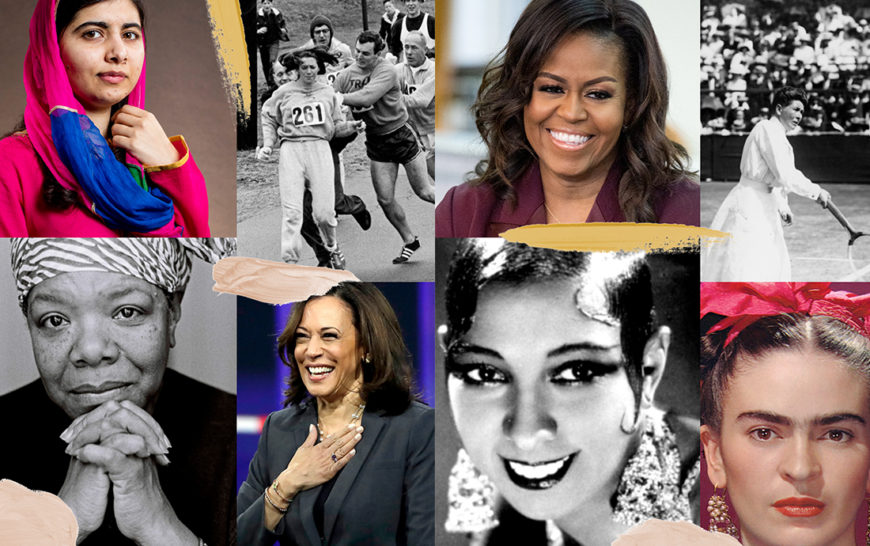
This International Women’s Day, we’re honouring the fierce female greats who changed the course of history, broke boundaries and defied societal expectations. From pioneering science and political milestones to radical acts of defiance, these are the precedent-setting women who blazed a trail for others to follow.
Emmeline Pankhurst (1858 – 1928)
In 1903, Emmeline Pankhurst and her daughter Christabel formed the militant wing of the women’s suffrage movement known as the Women’s Social and Political Unit (WSPU). The Representation of the People Act was passed just a few weeks after her death in 1928, granting full suffrage to women.

Emily Davison (1872 – 1913)
Often confused with Emmeline Pankhurst, Davison was a suffragette who died after she was struck by the king’s horse at the Epsom Derby in 1913. When it comes to her intentions, history is divided as to whether she was attempting to merely disrupt the race by attaching a suffragette’s flag to the horse, or she truly intended on killing herself. Whatever her motivation, she was prepared to die for the cause and become a martyr for women’s suffrage.
Amelia Earhart – The first female to fly solo across the Atlantic (1932)
Amelia Earhart became the first woman to fly solo across the Atlantic in a nearly 15-hour voyage.
Claudette Colvin The first Black woman to refuse to give up her seat on a bus (1955)
At just 15-years-old Claudette Colvin became a pioneer in the civil rights movement when she refused to give up her seat for a white man on a Montgomery bus on March 2, 1955. When the driver of a segregated bus ordered Colvin to get up she refused, saying she had paid her fare and that it was her constitutional right to sit there. She was arrested on several charges including violating the city’s segregation laws. Nine months later, Rosa Parks did the very same thing and Colvin received little recognition for her act of bravery.

Rosa Parks (1913-2005)
Rosa Parks, a 42-year-old Black seamstress, sparked a turning point in the US civil rights movement when she famously refused to give up her seat for a white man on a Montgomery, Alabama bus. Her actions sparked the Montgomery Bus Boycott lead by Martin Luther King, Jr. and a nationwide effort to end racial segregation. In 1956, the US supreme court ruled that segregated buses were unconstitutional.
Marie Curie – The first female Nobelist (1903)
Marie Curie née Maria Sklodowska became the first woman to win the joint Nobel prize with her husband Pierre Curie in 1903 and again in 1911, this time for pioneering research on radioactivity.
Margaret Sanger (1879-1966)
In 1914, Margaret Sanger emerged as the founder of the Birth Control Movement in the United States. She made it her mission to educate women about birth control and give them easy access to safe and reliable contraception. In 1916, she opened the first birth control clinic in America and in the 1950s, she initiated the research and development of the first oral contraceptive pill.

Valentina Tereshkova – The first woman in space (1963)
Valentina Tereshkova was the first woman to travel to space. She spent almost 3 days in space and orbited the Earth 48 times in her spacecraft, Vostok 6.
Gertrude Ederle – The first woman to swim across the English Channel (1926)
At age 20, Gertrude Ederle became the first woman to complete what was then considered one of the toughest endurance tests in the world, a feat only five men had managed before her. She finished the 21-mile swim in 14 ½ hours, beating the fastest man’s existing record by 2 hours.
Charlotte Cooper – The first female Olympic champion (1900)
In 1900, a 29-year-old Charlotte Cooper made history on the tennis courts when she became the first female Olympic champion in any sport. This feat is made ever more remarkable by the fact that she lost her hearing when she was 26, three years prior to her Olympic success.

Elizabeth Smith Miller – The first woman to wear trousers (1851)
Elizabeth Smith Miller was a life-long advocate and financial supporter of the rights for women movement. She is best known for being the first woman to wear Turkish pantaloons under a knee-length skirt, popularised by Amelia Bloomer in her periodical The Lily. Though trousers didn’t become acceptable everyday dress until the 20th century, the outfit known as bloomers paved the way for change and became a symbol of women’s emancipation, albeit ahead of its time.
Josephine Baker The first Black superstar (1927)
From homelessness to international fame, Josephine Baker was the first African American to star in a major motion picture. She also used to walk the streets of Paris with a pet cheetah on a leash, so she was not messing around when it came to breaking boundaries.

Elizabeth Blackwell – The first woman to graduate from medical school and become a doctor in the US (1849)
Bristol-born Elizabeth Blackwell graduated at Geneva College in New York with the highest grades in her class.
Maya Angelou (1928-2014)
Maya Angelou was a poet, historian, lecturer, actress, dancer, singer, director and civil rights activist who fought for social and racial justice alongside Martin Luther King Jr. and Malcom X. Her 1969 memoir I Know Why the Caged Bird Sings made literary history as the first nonfiction best-seller by an African American woman. Her contribution to American culture was most recently recognised in 2011 by President Obama when she was awarded the Presidential Medal for Freedom, America’s highest civilian honour.

Anne Frank (1929-1945)
Anne Frank, a young German-Dutch diarist of Jewish heritage, documented the harrowing account of her family’s attempt to hide for the Nazis during the Holocaust in what is arguably the most famous diary of all time.
Mother Teresa (1910-1997)
Considered one of the 20th century’s greatest humanitarians, Mother Teresa founded The Order of the Missionaries of Charity and dedicated her life to helping the sick and the poor, particularly in India. Today, the group has over 4,000 members who care for people all over the world. In 1979 she received the Nobel Peace Prize for work undertaken in the struggle to overcome poverty and distress and in 2016, she was declared a saint by Pope Francis.
Malala Yousafzai
In 2014, Malala became the youngest person to win the Nobel Peace Prize after surviving an assassination attempt in 2012 by the Taliban for her activism work. She has since launched an education fund called the Malala Fund to help girls around the world receive an education.

Jane Austen (1775-1817)
In Austen’s day, writing a novel was a radical act for a woman. Not only did she go against the norm by publishing novels, albeit anonymously, she also made women the central figures of her writing. Her six completed novels combine tales of love, life, dysfunctional families, women’s rights, realism and wit, and centuries on from her death, her heroes and heroines have still got a hold on us.
Florence Nightingale (1820-1910)
Florence Nightingale (known as The Lady with the Lamp) was the founder of modern nursing and reformer of hospital sanitation methods. At the age of 87, she was the first woman awarded the Order of Merit in 1907, in recognition for her service in the Crimean War and pioneering work in the health care field.
Michelle Obama
Between 2009- 2017, Michelle Obama served as the first African-American FLOTUS. During her time in the White House, she pushed for healthy living, championed equal rights and advocated for American families in poverty.

Princess Diana (1961-1997)
Princess Diana was determined to leave the world better than when she found it and though her tenure as Princess of Wales was tragically cut short, her humanitarian work was fundamental in changing the stigma surrounding HIV/AIDs.
Queen Elizabeth II
Following the death of her father King George VI in 1952, Elizabeth succeeded to the throne and was officially crowned Queen Elizabeth II in 1953. She has now been Queen for 68 years and counting and is the longest reigning monarch in British history. Not bad for a reign that wasn’t meant to be!
Eleanor Roosevelt (1884-1962)
Anna Eleanor Roosevelt was the longest-serving first lady of the United States of America, holding the post from 1933-1945. In 1946, Harry S. Truman appointed her as a United Nations delegate where she became the first Chairperson of the Commission on Human Rights and played an instrumental role in drafting the Universal Declaration of Human Rights. In 1968, she was posthumously awarded the United Nations Human Rights Prize.
Ada Lovelace (1815-1852)
A century before the first computer was built, mathematician and writer, Ada Lovelace, was credited with writing the world’s first machine algorithm laying the groundwork for today’s computer software.
Kamala Harris – The first female, Black and Asian-American Vice President (2021)
Upon inauguration in January 2021, Kamala Harris made history as the first female, first Black and first Asian-American US Vice President. Ms Harris, 56, was born in Oakland, California, to two immigrant parents – an Indian-born mother and a Jamaican-born father.

Margaret Hamilton
Hamilton is a trail-blazing American computer scientist credited with coining the term software engineer while developing the onboard flight navigation system for NASA’s 1969 Apollo space program. She was critical to sending humankind into space and very humble about it, too.
Cleopatra
The Queen of the Nile, the last Pharaoh of Egypt and the only woman to rule in her own right, Cleopatra still captivates historians, storytellers and artists centuries after her death.
Elizabeth Eckford The first Black student to attend an all-white high school (1957)
Elizabeth Eckford was one of the first African-American students, known as the Little Rock Nine, to attend an all-white school as a result of the “Brown v. Board of Education” supreme court case.
Kathryn Switzer – The first woman to run the Boston marathon (1967)
Kathryn Switzer made history when she defiantly became the first woman to run the Boston Marathon, even as race officials tried to physically stop her by pulling at her bib number as she ran. Back then, women were deemed too feeble to run the 26.2 mile distance. Fifty years later, Kathryn returned to the Boston Marathon to race again, donning the same number: 261.

Harriet Tubman (c.1820-1913)
Born into slavery in c. 1820, Harriet Tubman grew up working in the cotton fields. In 1849, she escaped her Maryland plantation fleeing 90 miles north to the freedom of Pennsylvania where she found work as a housekeeper. Intent on helping lead other enslaved people to freedom, she returned to the south on some 13 rescue missions to free 70 slaves using the so-called underground railroad network.
The Biden administration will seek to push forward the plan to make Harriet Tubman the face of the new $20 note. The abolitionist will become the first African-American to feature on a US bank note and the first woman in more than 100 years.
Sojourner Truth (c. 1797-1883)
A powerful outspoken advocate for abolition and civil women’s rights, best remembered for her speech on racial inequality, “Ain’t I A Woman” delivered at the women’s rights convention in 1851.
Dorothy Levitt – The first female racing driver (1903)
Dubbed ‘the fastest girl on earth’, Dorothy Levitt became the first woman to compete in a speed competition at the Southport Speed Trials in October 1903. In July 1905, she set her first Ladies World Speed record at the Brighton Speed Trials, driving a Napier car at 79.95 miles per hour.
Frida Kahlo (1907-1954)
Considered one of Mexico’s greatest artists, Frida Kahlo was a trailblazing feminist best known for her fierce self-portraits featuring her iconic unibrow and beflowered hair. In her work, she depicted taboo subject matter such as abortion and miscarriage, celebrated her facial hair in defiance of gender norms and channelled her debilitating chronic pain and trauma into passion on the canvas. Today, her legendary work and uncompromising resilience continues to inspire artists, women and the LGBTQ community the world over.





